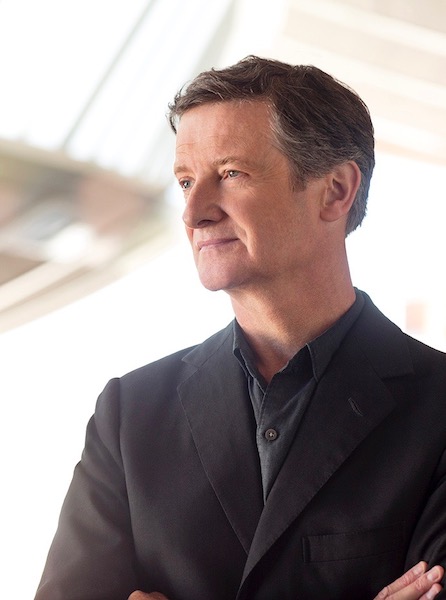Bicket takes Music of the Baroque on an engaging “Grand Tour”
Music of the Baroque offered an enjoyable musical expedition with “The Grand Tour” Wednesday night at the Harris Theater. Conducting from the harpsichord for most of the evening was Harry Bicket, who is currently in town leading performances of Handel’s Ariodante at Lyric Opera.
As indicated by its title, the program presented a breezy trip through the major music capitals of Europe, charting much the same itinerary as upper-class English travelers might have navigated in the 17th and 18th centuries.
Former WFMT host Carl Grapentine served as narrator, bridging each musical stop with readings of observations by contemporary travelers (compiled and written by MOB’s marketing director, Jennifer More).
Though this kind of spoken element is often redundant and adds little to the proceedings, the brief readings provided variety and helped to spice up a somewhat stylistically straitened first half (four concerti grossi). Though amusing and well-chosen for the most part, the selections centered a bit too heavily on the English travelers’ sniffy ethnocentrism; Grapentine’s folksy delivery and light touch helped take some of the sting out of the tourists’ more condescending comments on indigenous peoples.
Bicket is one of our finest Baroque musicians, as shown yet again Wednesday night. Conducting with minimal yet precise gestures from the harpsichord (his back to the audience), Bicket unobtrusively brought out the rhythmic spring and melodic richness of the evening’s selections.
The conductor is unassailable in music of Handel and his Concerto Grosso in B-flat major (Op. 3, no. 2) served as the evening’s embarkation point. Some may prefer more incisive cut-and-thrust in this repertoire, but Bicket’s easygoing approach has its own rewards, as he led a gracious and affectionate performance with a nice dance-like lilt. Anne Bach floated a gorgeous oboe solo in the Largo. The only debit was that with the ensemble stationed further back than usual on the Harris stage, Bicket’s harpsichord was nearly inaudible (though better balanced in the other works).
On to Italy and Corelli’s Concerto grosso in D major, (Op. 6, no. 4). Here too, Bicket’s tempos seemed unerringly right; he brought a stream-like flowing warmth to the Adagio and nicely insouciant swagger to the final Allegro.
Kathleen Brauer was concertmaster for this program and she had ample opportunities in the Corelli and elsewhere with repeated passages of showy brilliance for the first violin. Some fleeting intonation lapses apart, Brauer tackled the virtuosic pages in admirable fashion as did her principal second colleague Sharon Polifrone.
Geminiani’s expansion to large string ensemble of Corelli’s “La Follia” Concerto grosso in D minor closed out the first half. Here too, Bicket captured the elusive style of this hybrid work. He invested the opening Theme with stately gravitas and the performance of the contrasted variations vividly painted the work’s psychological dislocation—wild bravura bursts alternating with becalmed oases of peace. A strong performance by the MOB strings, though the back-and-forth solo exchanges proved unevenly matched between Brauer’s game virtuosity and principal cello Barbara Haffner’s more muted response.
Even for Baroque aficionados, Evaristo Felice Dall’Abaco is likely a new name. Yet as shown with his Concerto grosso a piu instrumenti in D major, (Op. 5, no. 6) the Italian composer—long resident in Germany—deserves wider recognition.
If the first section of this five-movement work suggests a more insistent Corelli, Dall’Abaco’s individuality is manifest in the balance of the concerto, with the Aria cantabile offering an especially radiant melody. Elsewhere there is an audacity and quirkiness that recall C.P.E. Bach—as with the organ glissandos of the Rondeau and the Ciaccona with its abrupt pauses, volume flips and percussion-thumping bass and theorbo. Bicket led a lively yet dynamically detailed performance that made a fine case for this intriguing composer.
Rameau’s Suite from the opera Les Boreades concluded the program.
The narrative of the tragédie en musique is typical piffle of the era, with the gods visiting inclement weather upon the queen Alphise for her rejection of the wind god Borée. Yet the French composer was the Berlioz of the Baroque, expanding the smallish, mid-18th century chamber ensembles, as here, to produce more brilliant colors and spectacular effects.
Conducting while standing for the first time, Bicket led a vital, vigorous performance that brought out all the varied music and myriad instrumental hues in Rameau’s score. The elegance and refinement of the evening’s first half were still manifest yet here invested with greater rhythmic bite and vitality.
Under Bicket’s alert direction, the MOB players effectively conveyed the character of each section, the vocal as well as the Terpsichorean. The “Rondeau vif” was duly fetching in its pastoral ease, and the lovely “Air Andante et gracieux” and Mary Stolper’s expansive flute solo in the first Contredanse were equally engaging.
The bold hues and virtuosic sections were given fine impact, from the spotlit piccolos (“Gavotte pour les Heures et les Zephirs”) to the wind machine, here creating a blustery tempest by timpanist Douglas Waddell.
All sections of the orchestra distinguished themselves in Rameau’s showpiece—and none more than hornists Jonathan Boen and Samuel Hamzem who handled their high, flamboyant solos with near-flawless polish and plenty of swagger.
Let’s hope that it’s not another long absence before Harry Bicket returns for more concerts with Music of the Baroque.
Harry Bicket will play the harpsichord when he joins forces with the Diderot Quartet for a chamber program 7:30 p.m. March 15 at the Chicago Temple. universe.com
Jane Glover conducts Music of the Baroque in Bach’s Orchestral Suite No. 2 and “Coffee Cantata,” and Haydn’s Symphonies Nos. 22 (“The Philosopher”) and 59 (“Fire”). Concert times are 3 p.m. March 31 at the North Shore Center in Skokie and 7:30 p.m. April 1 at the Harris Theater. baroque.org
Posted in Performances





